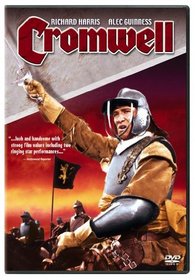| Actors: Richard Harris, Alec Guinness, Robert Morley, Dorothy Tutin, Frank Finlay Director: Ken Hughes Creators: Geoffrey Unsworth, Ken Hughes, Bill Lenny, Andrew Donally, Irving Allen Genres: Indie & Art House, Drama Sub-Genres: Indie & Art House, Drama Studio: Sony Pictures Format: DVD - Color,Widescreen,Anamorphic - Closed-captioned,Subtitled DVD Release Date: 10/07/2003 Original Release Date: 01/01/1970 Theatrical Release Date: 01/01/1970 Release Year: 2003 Run Time: 2hr 19min Screens: Color,Widescreen,Anamorphic Number of Discs: 1 SwapaDVD Credits: 1 Total Copies: 0 Members Wishing: 6 MPAA Rating: G (General Audience) Languages: English Subtitles: English, Spanish, French, Japanese |
Search - Cromwell on DVD
  | Cromwell Actors: Richard Harris, Alec Guinness, Robert Morley, Dorothy Tutin, Frank Finlay Director: Ken Hughes Genres: Indie & Art House, Drama G 2003 2hr 19min No Description Available. Genre: Feature Film-Drama Rating: G Release Date: 7-OCT-2003 Media Type: DVD |
Larger Image |
Movie DetailsSimilar Movies
Similarly Requested DVDs
|
Member Movie ReviewsReviewed on 8/17/2020... Outstanding production. Shown in many a history class. The issues raised in the English Civil War migrated to America as well. And when Cromwell finally gets his democracy, you can see how sloppy and debate infused the result is. 1 of 1 member(s) found this review helpful.
Movie ReviewsSatisfying Historical Film D. Mikels | Skunk Holler | 12/23/2002 (4 out of 5 stars) "This film has been shown in history classes in both Britain and the USA, and rightfully so. CROMWELL is a powerful, albeit uneven, movie depicting the struggle between Parliament and the crown that ultimately led to the English Civil War.Alec Guinness as King Charles I is simply superb. This gifted actor brings the insecure monarch to life before our very eyes, from his indecision to his eventual desperation to save his thrown--even his slight stuttering problem. Indeed it was Charles himself, by attempting in secret to form alliances with Catholic Ireland and France in order to defeat Cromwell's army, who was the catalyst to his own demise.Richard Harris is good, but somewhat over the top, as the brooding Oliver Cromwell, the musical score is nothing short of annoying, and the movie succumbs to the gushy melodrama characteristic of the time in which it was made. But despite its flaws, CROMWELL delivers a satisfying story about a turbulent time in English history." Overall, very entertaining 06/10/2000 (5 out of 5 stars) "I am a great student of the English Civil War and found this movie to be, overall, very entertaining despite just a few historical inaccuracies such as Oliver Cromwell being one of the five Parliament memebers that Charles I personally came to arrest ( Cromwell wasnt one of the five ). The costumes, stage sets and battle scenes, especially the cavalry charges, were without equal. A lot of the musical score was fitting and added to the atmosphere of the film. I dont believe that Harris's portrayal of Cromwell was uninspiring as previous reviewers have suggested. Cromwell, according to some historical sources, was a deep believer in freedom, both religious and private property, hence the films early reference about Cromwell leaving England for America. Cromwell was simply not known, historically, to have worn his emotions on his sleeve. Timothy Dalton's Prince Rupert was magnificent. Alec Guiness certainly looked like Charles I. Truthfully, most of the actors fairly resembled their characters.I know this film was made for mass audiences and thus needed star name appeal to sell it. But it is too bad that this most interesting period of history could not have been portrayed in a miniseries (in the way Glenda Jackson's ELIZABETH R was) with all the same actors. That way, other central characters such as Charles I, Thomas Wentworh the Earl of Strafford, Parliamentary leader John Pym and others could have been developed more fully because they are just as interesting as Cromwell. Not to mention the decade or so long struggle between Parliament and Crown that led up to the Civil War and Thomas Wentworths treachery by going from Parliaments greatest champion to being Charles I right hand man thus earning Parliaments unending enmity. Lots of great storyline potential there. Yes, it is too bad it was not made as a miniseries because so much dramatic history was left out. This film gem was unfortunately to brief. But I liked it alot!" Our Chief of Men blockhed | UK | 12/25/2004 (5 out of 5 stars) "A magnificent summary of the fundamental issues, and their resolution, which made the British nation what it once used to be, and was for 300 years, right up until 1945. There is obviously not the slightest hope of compressing the complicated historical events from 1640 to 1660 into 2 hours, and simplification is so inevitable as to be not worth even discussing. But the basics are presented with excellent clarity, and produced with a marvellous balance between entertaining drama and solid essentials. Guinness and Harris are both on tremendous form: the defining characteristics of Charles were vacillation and weakness, and those of Cromwell force and resolution. Both were pious in their own ways. Charles, however, thought he could do what he liked in his position because God had put him there. Cromwell didn't share this belief, and that is what makes him a great man, and a great architect of the British political values which lasted for so long. The ruthless crushing of the threat in Ireland has to be addressed, of course, and perhaps I'll add something on that at a later date. Such was the man's personality, however, that even an author from a British Roman Catholic background felt obliged to title her biography: "Cromwell, Our Chief of Men"."
|


![To Kill A King [Blu-ray]](https://nationalbookswap.com/dvd/s/94/3394/183394.jpg)













